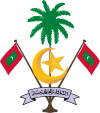Politics of Maldives ދިވެހިރާއްޖޭގެ ސިޔާސަތު | |
|---|---|
 Emblem of Maldives | |
| Polity type | Unitary presidential constitutional republic |
| Constitution | Constitution of Maldives |
| Legislative branch | |
| Name | People's Majlis |
| Type | Unicameral |
| Presiding officer | Abdul Raheem Abdulla |
| Executive branch | |
| Head of state and government | |
| Title | President |
| Currently | Mohamed Muizzu |
| Appointer | Direct popular vote |
| Cabinet | |
| Name | Cabinet of the Maldives |
| Leader | President |
| Deputy leader | Vice president |
| Appointer | President |
| Judicial branch | |
| Name | Judiciary in the Maldives |
| Chief judge | Ahmed Muthasim Adnan |
| This article is part of a series on the |
| Politics of the Maldives |
|---|
 |
The politics of the Maldives take place in the framework of a presidential representative democratic republic, whereby the President is the Head of Government. Executive power is exercised by the government. The President heads the executive branch and appoints the Cabinet; like many presidential democracies, each member of the cabinet need to be approved by the Parliament. The President, along with their pick for vice president, is directly elected by the denizens to a five-year term by a secret ballot. Once in office, they could be re-elected to a second 5-year term, which is the limit allowed by the Constitution. The current President of the Maldives is Mohamed Muizzu, when his predecessor, Ibrahim Mohamed Solih lost the 2023 Maldivian presidential election.[1][2]
The unicameral Majlis of the Maldives is composed of 93 members serving a five-year term.[3] The total number of the members representing each constituency depends on the total population of that constituency. The last parliamentary election was held on 21 April 2024.
The Maldivian legal system is derived mainly from the traditional Islamic law. There is a Supreme Court with 5 judges including the Chief Justice. The Chief Justice is appointed by the President, with the recommendation of the Judicial Service Commission. Parliament is required to approve the appointment before he assumes office. Excluding the Supreme Court, there also exists the High Court (two branches), a Criminal Court, Civil Court, Family Court, Juvenile Court, Drug Court and many Lower Courts in each Atoll/Island. An Attorney General is part of the Cabinet and also needs the approval of Parliament before taking office.
Under the new 2008 constitution, the function of Local Government is devolved to an Atoll Council to administer each atoll and an Island Council to administer each inhabited island. Island councilors are elected by the people of each island, and the Atoll Councilors are in turn elected by the Island Councilors.
The Constitution of the Maldives requires the following for a president: be a Maldivian citizen born to parents who are Maldivian citizens, and who is not also a citizen of a foreign country; be a Muslim and a follower of a Sunni school of Islam;[4]
Maldives was 2023 the 9th most electoral democratic country in Asia according to V-Dem Democracy indices.[5]
- ^ "Dr Mohamed Muizzu sworn in as the 8th President of the Maldives". The President's Office. Retrieved 2023-12-08.
- ^ Udhma, Fathimath (30 September 2023). "Dr. Muizzu wins 2023 Presidential Election". Raajje TV. Retrieved 8 December 2023.
- ^ Mohamed, Mariyath (28 May 2024). "93 Members of the 20th Parliament take oath of office". The Edition. Retrieved 4 September 2024.
- ^ "Constitution of the Maldives" (PDF). The President's Office. p. 52. Retrieved 9 April 2024.
- ^ Nord, Marina; Lundstedt, Martin; Altman, David; Angiolillo, Fabio; et al. (2024). Lindberg, Staffan I. (ed.). Democracy Report 2024: Democracy Winning and Losing at the Ballot (PDF) (Report). University of Gothenburg: V-Dem Institute.